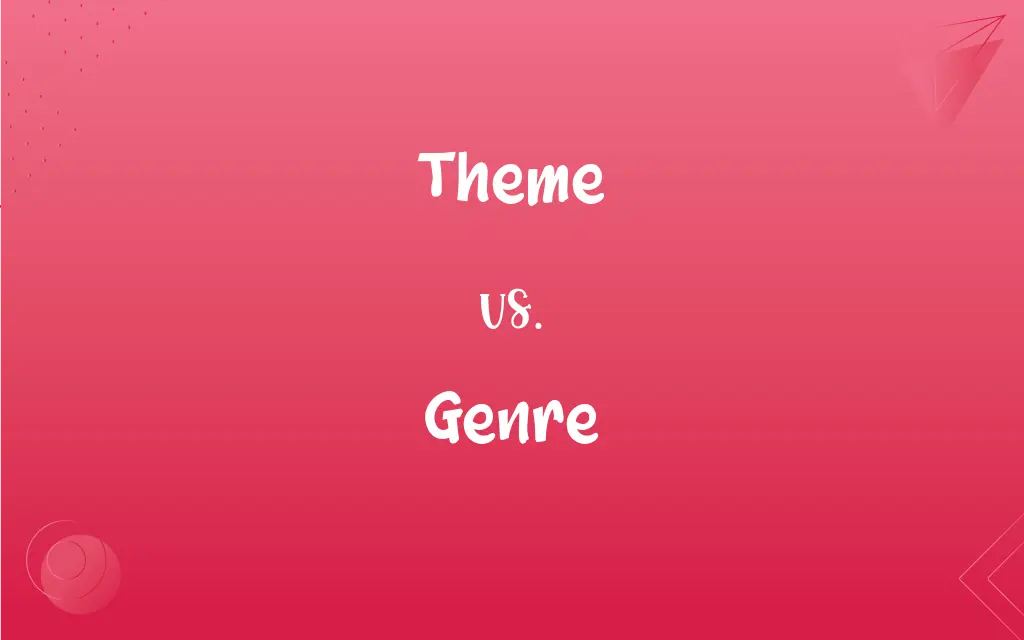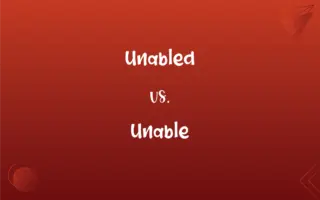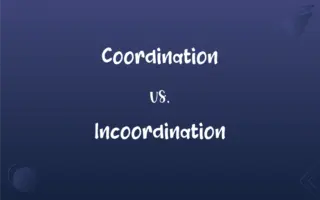Theme vs. Genre: What's the Difference?
Edited by Harlon Moss || By Janet White || Updated on October 2, 2023
The underlying message or lesson of a story. A category of artistic composition, marked by distinctive style, form, or content.

Key Differences
Theme pertains to the central idea or message conveyed through a story or piece of writing. On the contrary, genre refers to the categorization of a work based on stylistic and thematic criteria, encapsulating various mediums like literature, music, or film.
A theme offers insights or a particular viewpoint from which the narrative is penned. Contrarily, genre establishes a framework or a set of conventions under which the narrative operates, steering its structural and stylistic choices.
Themes are often universal, addressing broad and inherent aspects of human experience, emotion, or condition. Genres, however, are specific, providing particular parameters or guidelines which the creators usually adhere to for coherence and categorical familiarity.
Identifying a theme might involve digging into the deeper meanings, symbols, or moral messages within a narrative. In contrast, identifying a genre might involve recognizing specific tropes, styles, or conventions that align with established categories.
Themes can traverse across various genres, meaning a similar theme might be found in works of different genres. However, genres are relatively fixed, each presenting a specific set of expectations, rules, and stylistic elements that typify them.
ADVERTISEMENT
Comparison Chart
Definition
Central idea or message in a piece.
Category based on style, form, or content.
Nature
Can be universal and found across different genres.
Specific and adheres to particular conventions.
Identification
Requires discerning underlying meanings or morals.
Identified through specific tropes and styles.
Usage in Creation
Creators embed themes to offer depth or insight.
Creators choose genres to set structural rules.
Variation
A theme can be expressed in varied ways across various works.
A genre usually maintains its defining attributes.
ADVERTISEMENT
Theme and Genre Definitions
Theme
A theme is an underlying message or meaning in a story.
The theme of love and sacrifice permeates “Romeo and Juliet.”
Genre
Genre is a category of artistic creation sharing a common style or subject matter.
Horror is a genre designed to frighten or disturb its audience.
Theme
Theme can refer to a subject of discourse or discussion.
The theme of the conference revolves around renewable energy solutions.
Genre
In painting, genre refers to works depicting scenes from everyday life.
During the 17th century, Dutch genre painting was remarkably popular among the middle class.
Theme
In computing, a theme refers to a preset package containing graphical appearance details.
She customized her blog using a colorful theme.
Genre
In literature, a genre pertains to a category characterized by similarities in form, style, or subject matter.
Mystery is a genre involving suspenseful situations and solving crimes.
Theme
In an exhibition, a theme is a particular subject or idea around which it is organized.
The museum’s new exhibit has a theme centered on ancient civilizations.
Genre
In film, genre refers to a categorization based on similarities in the narrative elements.
Science fiction is a genre that deals with futuristic and speculative concepts.
Theme
A topic of discourse or discussion.
Genre
In music, genre refers to a musical category defined by a particular style, form, and content.
Jazz is a genre known for improvisation and expressive melodies.
Theme
A subject of artistic representation.
Genre
A category of artistic composition, as in music or literature, marked by a distinctive style, form, or content
"his six String Quartets ... the most important works in the genre since Beethoven's" (Time).
Theme
An implicit or recurrent idea; a motif
A party with a tropical island theme.
Genre
A realistic style of painting that depicts scenes from everyday life.
Theme
A short composition assigned to a student as a writing exercise.
Genre
A type or class
"Emaciated famine victims ... on television focused a new genre of attention on the continent" (Helen Kitchen).
Theme
(Music) A recurring melodic element in a composition, especially a melody forming the basis of a set of variations.
Genre
A kind; a stylistic category or sort, especially of literature or other artworks.
The still life has been a popular genre in painting since the 17th century.
This film is a cross-genre piece, dark and funny at the same time.
The computer game Half-Life redefined the first-person shooter genre.
Theme
See topic.
Genre
Kind; genus; class; form; style, esp. in literature.
French drama was lisping or still inarticulate; the great French genre of the fabliau was hardly born.
A particular demand . . . that we shall pay special attention to the matter of genres - that is, to the different forms or categories of literature.
Theme
A stem.
Genre
A style of painting, sculpture, or other imitative art, which illustrates everyday life and manners.
Theme
A subject, now especially of a talk or an artistic piece; a topic.
Genre
A kind of literary or artistic work
Theme
A recurring idea; a motif.
Genre
A style of expressing yourself in writing
Theme
A concept with multiple instantiations.
Variations on the theme of entrepreneurial resourcefulness
Genre
An expressive style of music
Theme
Any of various colors, or color palettes, in which a design is offered; (GUI) any of various skins for an app, affecting the visuals and perhaps other elements such as sound effects.
Switch to a dark theme to conserve battery power
Genre
A class of art (or artistic endeavor) having a characteristic form or technique
Theme
(dated) An essay written for school.
Theme
(music) The main melody of a piece of music, especially one that is the source of variations.
Theme
A song, or a snippet of a song, that identifies a film, a TV program, a character, etc. by playing at the appropriate time.
Theme
(grammar) The stem of a word.
Theme
(linguistics) thematic relation of a noun phrase to a verb.
Theme
(linguistics) Theta role in generative grammar and government and binding theory.
Theme
(linguistics) Topic, what is generally being talked about, as opposed to rheme.
Theme
A regional unit of organisation in the Byzantine empire.
Theme
(transitive) To give a theme to.
We themed the birthday party around superheroes.
Theme
To apply a theme to; to change the visual appearance and/or layout of (software).
Theme
A subject or topic on which a person writes or speaks; a proposition for discussion or argument; a text.
My theme is alway one and ever was.
And when a soldier was the theme, my nameWas not far off.
Theme
Discourse on a certain subject.
Then ran repentance and rehearsed his theme.
It was the subject of my theme.
Theme
A composition or essay required of a pupil.
Theme
A noun or verb, not modified by inflections; also, that part of a noun or verb which remains unchanged (except by euphonic variations) in declension or conjugation; stem.
Theme
That by means of which a thing is done; means; instrument.
Theme
The leading subject of a composition or a movement.
Theme
The subject matter of a conversation or discussion;
He didn't want to discuss that subject
It was a very sensitive topic
His letters were always on the theme of love
Theme
A unifying idea that is a recurrent element in a literary or artistic work;
It was the usual `boy gets girl' theme
Theme
(music) melodic subject of a musical composition;
The theme is announced in the first measures
The accompanist picked up the idea and elaborated it
Theme
An essay (especially one written as an assignment);
He got an A on his composition
Theme
(linguistics) the form of a word after all affixes are removed;
Thematic vowels are part of the stem
Theme
Provide with a particular theme or motive;
The restaurant often themes its menus
Theme
In music, a theme is a repeated melodic or harmonic idea.
The theme of Beethoven's Symphony No. 5 is immediately recognizable.
FAQs
How is theme different from a subject?
A subject is a topic being discussed, while a theme is an underlying message about that topic.
Can a piece of writing belong to multiple genres?
Yes, a work can blend elements of different genres, known as a hybrid or cross-genre.
How many basic literary genres are there?
Traditionally, literature is divided into poetry, prose, and drama, but there are numerous sub-genres.
What is a theme in literature?
A theme is a central idea, message, or insight explored in a work of literature.
What is a genre in literature?
Genre categorizes literary work based on stylistic, thematic, and content similarities.
Can genres change or evolve over time?
Absolutely, genres can evolve and new sub-genres can emerge.
Is theme equivalent to a moral?
Not necessarily, while a moral is a lesson learned, a theme is an underlying message or insight.
Can a story have more than one theme?
Yes, a story can explore multiple themes simultaneously.
What’s an example of a theme?
A common theme is ‘the struggle between good and evil.’
What purpose does genre serve for readers?
Genre provides readers with expectations and a framework for understanding a work.
Can a theme be stated explicitly?
Themes can be explicit, but they are often implied, requiring interpretation.
Are themes universally applicable?
Yes, themes often explore universal concepts and emotions that can be understood widely.
Is identifying genre always straightforward?
Not always. Some works blur the lines between genres and are subject to interpretation.
Does every story have a theme?
Most stories have at least one theme, though it may not always be overtly present.
How is genre determined in literature?
Genre is often determined by thematic elements, stylistic approach, and content.
About Author
Written by
Janet WhiteJanet White has been an esteemed writer and blogger for Difference Wiki. Holding a Master's degree in Science and Medical Journalism from the prestigious Boston University, she has consistently demonstrated her expertise and passion for her field. When she's not immersed in her work, Janet relishes her time exercising, delving into a good book, and cherishing moments with friends and family.
Edited by
Harlon MossHarlon is a seasoned quality moderator and accomplished content writer for Difference Wiki. An alumnus of the prestigious University of California, he earned his degree in Computer Science. Leveraging his academic background, Harlon brings a meticulous and informed perspective to his work, ensuring content accuracy and excellence.































































